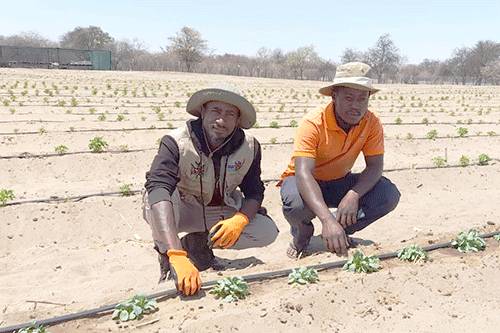Hilma Hashange
They say farming is not a job but rather a calling, and it takes passion and perseverance to be able to farm full-time.
Phillip Namburu (33), who served for five years as an officer of the law within the ranks of the Namibian Police Force, said he found his calling when he started a horticultural project.
The father of five said he had a desire to be a firefighter and for a certain period, got to do his dream job. But his dream was cut short when his contract was not renewed.
Namburu said he needed to find a way to earn an income so that he could provide for his family, who were dependent on him. He thus started farming.
He hails from Omuthiya in the Oshikoto region, but was raised in Windhoek, and started the Nelambo Green Farm in July with his cousin, Petrus Shipululu.
The project is based at Omutsegonime village in the Omuthiya district on a hectare of land.
“After the death of our grandmother, I came back home, and saw how my people who are stationed at the Omuthiya open market struggled to get fruits and vegetables to sell. I then realised that we had a large piece of land at my late grandmother’s homestead which was not being utilised,” said Namburu.
He pitched the idea of starting a horticulture project on the piece of land to his family, and they agreed.
“With the help of my cousin and my mother, we decided to set up a horticulture project on the land. We realised there is a lack of food security, and as young people, we wanted to play our part and contribute to the wellbeing of our country,” he added.
Equipped with no agricultural or farming experience, the cousins conducted research on the internet on how to grow plants, and embarked on their farming journey.
Namburu said he first set up water infrastructure at the piece of land and after fencing off the area, he reached out to an employee of the Okashana Rural Development Centre (ORDC), who informed him about the grants given to upcoming horticulture farmers.
The centre’s officials told him that he needed to get quotations on what he required for the project. They also informed him that the centre would only be paying 65% of his farming needs, and he would finance the remaining 35%.
“The ORDC really helped us a lot. They provided us with trays where we grow our seedlings by using in-growth compost. The seeds stay in the trays for approximately one month. They are then later transplanted into the seedbeds,” said Namburu.
The centre gave them shade nets, a water tank and some basic gardening tools such as shovels, garden forks and a few planting bags.
In a few weeks’ time, they will be setting up an orchard, where lemons and oranges will be planted.
“We have already transplanted cabbages, tomatoes, green peppers, carrots and Swiss Chard in September. We use drip irrigation, which is cost-effective”, said Namburu.
There is, however, a shortage of water supply at the farm as they require about 2 500 litres of water daily.
“We do not have a borehole, so our water supply is from NamWater, which is very costly. If we could get assistance to dig a borehole, things would be better,” said Namburu.
In the future, he wants to venture into crop production, poultry farming and cuniculture.
“I also want to establish a livestock farm as well as grow maize and lucerne to supplement farmers with feed during droughts,” he enthused.
Nelambo Green Farm recently hosted Grade 7 agriculture learners from the Oshifukwa Combined School. They were given a tour of the plantation, and got an insight into the practical agricultural methods they were taught in school.
* Hilma Hashange is an information officer for the MICT in the Oshikoto region.


